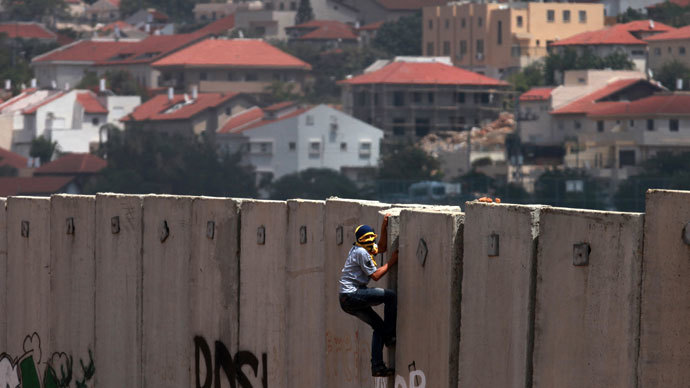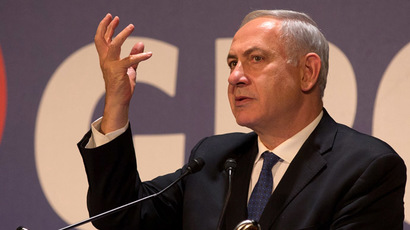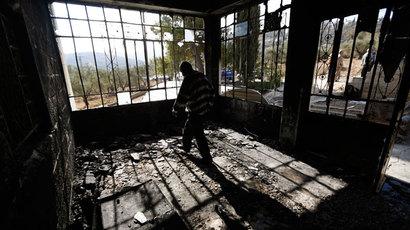Israel approves 381 more settler homes in West Bank

In the latest blow to the Middle East peace process, Israel has approved plans to build another 381 settler homes in the West Bank. The move brings the total number of planned units announced since the start of the year to 2,530.
"The Israeli Civil Administration, which falls under the Defense Ministry, has published plans for the construction of 381 extra units in Givat Zeev [near the annexed East Jerusalem],” Israeli settlement watchdog Peace Now told AFP.
This is the third such announcement by the Israeli government since the beginning of the year.
On January 6, it unveiled plans for 272 new homes in various West Bank settlements. The move was followed by the announcement of another 1,877 new units on January 10.
“This is the third time since the last phase of Palestinian prisoner releases that the government has approved plans for new houses,” Peace Now spokesman Lior Amihai said.
The announcements follow Israel’s release of 26 Palestinian prisoners on December 31, which took place as part of US-brokered peace talks that resumed in July following a three-year break.
"Netanyahu's government does not want peace," Palestinian chief negotiator Saeb Erakat told AFP.
The peace talks, which have stalled ahead of the April deadline for a framework agreement, have produced little progress. However, Erakat says the Palestinians will not be accepting an extension.
"We've not been presented with a [plan for] extending negotiations, but we will not extend them for even an additional day after the nine-month period we agreed on," he said.
"There are still three months left, which Israel can use to move with us towards a peace agreement, but its actions confirm that it's not interested in this. It's destroying everything that might help a comprehensive peace agreement."
Last week, four key European states summoned Israeli ambassadors over the January 10 settlement announcement, drawing a strong reaction from Israeli Prime Minister Benjamin Netanyahu.
The prime minister accused the EU of “hypocrisy” for choosing to condemn Israeli settlement construction, and not Palestinian incitement.
“I think it’s time to stop the hypocrisy and inject some fairness in the discussion,” Netanyahu told an annual reception of foreign journalists in Jerusalem on Thursday, as reported by the Jerusalem Post.
He also said that the EU’s bias does not foster peace, but in fact undermines it because “it tells the Palestinians that they can engage in incitement and terror and not be held accountable.”
Israeli Foreign Minister Avigdor Lieberman subsequently called in the ambassadors of the UK, France, Italy, and Spain, stressing to them “that their perpetual one-sided stance against Israel and in favor of the Palestinians is unacceptable and creates the impression they are only seeking ways to blame Israel,” Lieberman’s spokesman said in a statement, as quoted by AFP.
Netanyahu also addressed claims that settlements are an obstacle to a peace agreement, calling such assertions “bogus.”
“Adding a few houses will not change the map an iota,” Netanyahu said, adding that he wondered if the Palestinians were looking to create an “ethnically cleansed state.”
Adding to tensions last week, Israel’s ambassador to the UN, Ron Prosor, slammed the UN’s ‘Year of Solidarity with the Palestinians’ as “propaganda.” In November, the United Nations General Assembly adopted a resolution that named 2014 as the year dedicated to identifying obstacles to the peace process and promoting solidarity with the Palestinians.
“Rather than putting an end to Palestinian incitement, the UN is now the primary platform for Palestinian propaganda,” Prosor said on Thursday.
“The organization allocates endless resources to advancing lies and half-truths of the Palestinian leadership instead of dealing with pressing issues facing the international community and the Middle East region,” he added.
Prosor also said that while the UN encouraged “solidarity,” the Palestinian Authority continued to propagate a culture of hatred towards Israel, claiming that cross-border attacks had “doubled” in the past year. He asked why the UN had not designated 2014 as a year of “solidarity with the Israeli victims of terror.”
“The time has come to stop this hypocrisy and ask why there is no solidarity with the Israeli victims of terrorism and their families,” Prosor said.
The US, Australia, Canada, Israel, the Marshall Islands, Micronesia, and Palau voted against the UN’s ‘Year of Solidarity with the Palestinians.’














